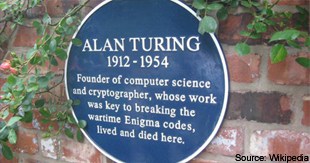Mathematician and computer scientist Alan Mathison Turing, born in London in June 1912, is perhaps most famous for his key role in cracking the code used by the Nazis in their Enigma machines in the Second World War.
As Head of Hut 8, at Bletchley Park, home to the Government Code and Cypher School, he was the mathematician in charge of analysing coded messages sent by the German navy. As part of this work he devised, in 1939, a electromechanical machine known as the “bombe”. The bombe’s function was to work out the daily settings of the German “Enigma” machine which was used to encipher coded messages. Cracking the enigma code was given the code name “Ultra” and at the end of the WWII Winston Churchill is reported to have told King George VI, “it was thanks to Ultra that we won the war.”
After the war, Turing took a job at the National Physical Laboratory in Middlesex, picking up on his pre-war work at Cambridge on computers, where he has been credited coming up with a theory for the world’s first in detail stored programme computer – the Universal Turing machine. At NPL he proposed a machine dubbed the “Automatic Computer Engine” or ACE. However, the building of ACE was delayed and Turing moved to the Mathematics Department at what is now the University of Manchester. Whilst in the North-West he helped build the “Manchester Mark I” – one of the earliest stored programme computers.
Then, in a landmarked paper of 1950, Turing addressed the question of computers and intelligence. He was asking at what point a computer can be deemed as intelligent. From this discussion the “Turing Test” was born and it still plays a crucial role in artificial intelligence and robotics to the present day. In his test Turing says that a machine can be deemed intelligent if it is able to engage in a conversation with a human interrogator and fool them in thinking that it is also human. In most tests a human has a conversation with two hidden partners, one computer one machine. If the human cannot tell the difference then the machine has passed the Turing Test. No machine has currently passed.
Turing’s life ended prematurely, aged just 41, in 1954. He died of cyanide poisoning. A subsequent inquest recorded the death as suicide. Turing had been prosecuted for homosexual acts in 1952 and rather than go to prison accepted a treatment of female hormones. In September 2009, then UK Prime Minister, Gordon Brown offered an official public apology from the UK government for the way Turing had been treated.






